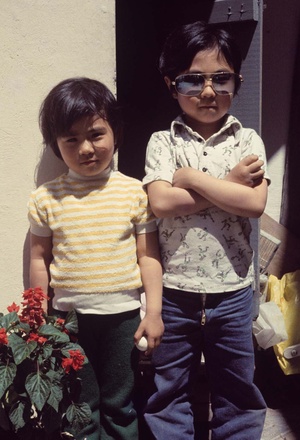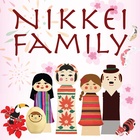The first time I went to Japan was to save my daughter V. She was just a few months old and had been born with a tumor, but no one in Buenos Aires wanted to operate on her. Then Aki, my husband, called his brother, who is a surgeon in Okinawa.
It all happened in two weeks. My brother-in-law knew a certain Hasegawa sensei . We had to travel as soon as possible. After 40 hours of travel, Aki, my son M., my daughter V. and I arrived in Tokyo. It was already Saturday, something we had not calculated. My brother-in-law was there to greet us and tell us that the hospital, the Gan Center, could not admit us, that we had to wait until Monday. He took us to the hotel, to a room prepared with a special crib, serum and other things that you only see in hospitals. My brother-in-law had taken care of everything.
I didn't leave my baby alone and I barely slept those two days. While I monitored my daughter's breathing I couldn't stop thinking about my parents' house, in Concepción del Uruguay. I was born there, on Alberdi Street, next to the dry cleaners. The house had a long patio that on some Wednesdays was filled with food. Dad and mom cooked for two days to fill boxes and boxes with Milanese, baked potatoes and sweet potatoes, gojan with yasai-itame and river fish tempura . The first time I thought we were going to have a party or something, but no. Dad explained to me that all that food was for the people on the train. For some years, on Wednesdays a train passed through the Concepción del Uruguay station. A train full of people who were going to settle in Misiones. Many came from Japan. The trip to Misiones is long, Dad explained to me.
On Monday we went to the Gan Center and met Hasegawa sensei , the next day my daughter entered the operating room. The operation lasted several hours. My barely two-year-old son had endured with great composure the tedium of the trip, the days of confinement in the hotel, the anxiety and terror of his parents, but now there was no way to calm him down. I cried for all three. After a few hours, the same exhaustion managed to put him to sleep and for a while there was only the silence of our footsteps on the tiles. Then, Hasegawa sensei left the operating room, with the basin and gloves on. I saw his eyes, covered my mouth and walked away from him. I sat up before my legs gave way. Aki spoke for a long time with Hassegawa sensei . Finally he came closer and started moving his mouth. V. okay, I finally understood. Listen to me. Your daughter is fine. She's fine but they have to operate on her again, they found another tumor.
That same night I settled in the hospital. They had assigned us a room on the foreigners' floor; We had to wait twenty days for the second intervention. It became night and Aki returned with M. to the hotel. I looked at the crib, which was large, made of acrylic and steel. Cables came out of the wall that went to some devices, from the devices other cables and tubes that went to my daughter. V. looked tiny. It took up a fraction of the mattress and it was difficult to understand how it all went to his body. I tried to sleep, but it was impossible. Every time I closed my eyes I opened them again to make sure that you were breathing. I got up and, careful not to move anything, climbed into the crib. I curled up next to my daughter and closed my eyes.
One Wednesday in Concepción I returned home from school. In the patio, where they had taken the shipment of food that morning, my family was gathered with a Japanese couple. Except for Mom and Dad, they were the first Japanese I had ever seen. Mom intercepted me on the way to my room. He's busy, he said. By whom? I wanted to know. Mr. and Mrs. T.'s son, he said, gestured toward the couple and motioned for me to be quiet. Through the half-open door I made out the figure of Dr. G., an acquaintance of the family, next to a child who was lying in my bed.
The next morning I woke up to the sound of the door. A nurse looked into our room and I was still in the crib. I carefully sat up while the nurse closed the door again and waited in the hallway. I dodged the cables and sat on the couch.
After a while Aki arrived with M. Hasegawa sensei came at noon. Wrapped in a scarf, he brought his bento. Can I eat with you? he said. During that lunch, we barely exchanged a word. We all ate sitting around a tiny table, sharing the sodas Aki had bought, and Hasegawa sensei insisted that we try his wife's food.
That Wednesday in Concepción del Uruguay we shared lunch with Mr. and Mrs. T., while we waited for Dr. G. to leave my room. Dad had met them at the train station, when they were asking for help for their son. We never knew what illness he had but it was a serious one. Dad, with the promise that he would pay for the ticket to Misiones the following week, managed to get his belongings taken off the train and accompanied to our house. When the doctor finally came out to the patio he wanted to talk to dad alone.
This time, Hasegawa sensei was the one who woke me up in the crib. Once again I had to go out very carefully, between the cables and the drowsiness. He checked on my daughter, made his notes, and walked over to where I was sitting. Don't worry, ma'am, he said in English, your daughter will be fine. Women are strong, he said and smiled.
After twenty days of living on the ninth floor of the Gan Center hospital in Tokyo, after hearing whispers in dozens of languages, after imperceptible gestures of encouragement that passed in that silent hallway, gestures that were perfectly understood regardless of the country of origin, my daughter underwent surgery for the second time.
One day when I had to work at the dry cleaners, many years after that Wednesday of my childhood, a man and a woman entered the store. They were Japanese although they spoke Spanish quite well. The man asked about dad. That couple were the Ts. They told us that the child who had slept in my bed had not survived, but that they had not forgotten what Dad had done for them, that Dad's gesture kept the memory of their firstborn alive in their hearts. They stayed just a few minutes, long enough to have tea and leave the presents they had brought.
On November 24, 1973, a week after the second successful operation, my daughter V. turned one year old and we celebrated in her hospital room. We bought cake, balloons and decorations. Hasegawa sensei spent a few moments before we lit the candle. He left us a box. It's something my wife prepared, she explained to us, it's clothes that my daughter used to wear but now she's grown too big. In the box, two tiny kimonos that I still keep in the closet at home. M., sitting next to his sister, blew out the candle on the cake and we all applauded.
© 2015 Regina Arakaki & Maximiliano Matayoshi





